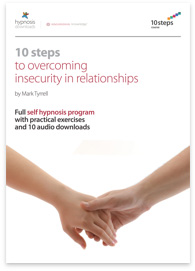What Psychology Says About Getting Over Divorce
8 tips to help you get life back on track after divorce
 "Divorce can leave a painful hole in your life" courtesy of jcoterhals
"Divorce can leave a painful hole in your life" courtesy of jcoterhals"Divorce is the psychological equivalent of a triple coronary bypass. After such a monumental assault on the heart, it takes years to amend all the habits and attitudes that led up to it." - Mary Kay Blakely
Is there life after divorce?
Well, yes, it takes time to get over a divorce and yes, it can have a big emotional impact, but there are things you can do to:
- Speed up the process.
- Stop you chewing over the past more than necessary.
Divorce, whether it was something you wanted or not, can leave you feeling sad, even hopeless. Guilt, anger, resentment, bitterness, a sense of betrayal, feelings of hatred even, all cloud your brain as you try to continue life as 'normal'. And if children are involved, a sense of aching guilt can pervade as you try to cope.
And then there's the money. With divorce come economic changes, often hardships; the future can feel like a strange and foreign land. Protracted legal wrangles whilst having to deal with the very person you loved or love through a professional formal third party can seem depressingly unreal.
But within every change lies opportunity.
The secrets to life after divorce
"May you have a strong foundation when the winds of changes shift." - Bob Dylan, "Forever Young"
Of course, the first thing to say is that you should not, perhaps, expect to get over divorce straight away. If you're following one path and all of a sudden that path is blocked or simply no longer there, it's natural to stop for a while, consider the terrain in which you find yourself, and eventually start moving again, perhaps in a new direction along a newer path. So, give yourself time.
But if divorce, and all the trials and tribulations that go with it, becomes your over-riding focus (which is quite natural for a while), then other parts of your life get neglected. And that's a real problem.
The truth is we all have basic or 'primal' emotional needs that, when fulfilled, make us feel better - even happy. Often when life lobs hardships our way, the stress makes us neglect our emotional needs or we believe wrongly that they can no longer be met at all or that trying to fulfil them will not have any benefit.
For example, we all need the comfort and support of friends, connection to community, and exercise. We all need attention and a sense of security; we all need to relax and have fun.
And we need these more, not less, during times of tribulation. Just because you're going through divorce, it doesn't mean you don't still have these basic human requirements. So my first tip for getting over a divorce links to your basic emotional need for human connection.
1) Seek solace
Don't go it alone. It's important for you to talk to someone, perhaps a good friend or family member. Make a conscious effort to meet up, perhaps once a week, and talk. Maintain your social life even if you don't feel like it. Sure, you might be a little less sociable for a while; we all need to withdraw sometimes to recoup energy and make sense of life. But I urge you not to withdraw completely for too long.
A 'community' isn't just a collection of people. Rather, we can see it almost as an organism which can provide help, comfort, and strength. Draw from the community of your social network. Ensure that you still attend that class every fortnight, meet with friends, and chat on the phone a couple of times a week. It will help. But...
2) Compartmentalize your attention
During divorce, all we may want to think and talk about is...divorce. Quite natural - but here's a thing:
It's sometimes said that men tend to compartmentalize in their brains better than women do. So a man may be depressed about something (such as losing his job), but when he's focussing on something else, such as a hobby or interest, he puts the job loss into another compartment in his mind and no longer feels that bad. In this way, he might stay out of depression because depression needs to be all-encompassing to wreak havoc in a person's life.
Being able to compartmentalize thoughts and feelings is both an advantage and a disadvantage. When we don't compartmentalize, we can 'multi-task'; not being able to find the pepper pot may be a sign that we are seeing in narrow 'compartments'; and so forth. But if men do compartmentalize their emotional lives more than women, this might be a reason that men suffer less depression, on average, than women do (1).
Being able to lock divorce preoccupation away for a few hours whilst you focus on other stuff is an extremely healthy thing to do. So when seeing a friend or friends, purposefully and consciously have half an hour here or even eventually a whole evening there when you don't talk about the divorce. You can even say: "I'm sorry, but I've promised myself I'm not going to discuss the divorce. Let's talk about other stuff tonight." This will help train your brain more quickly to stop thinking about it all the time.
This might not feel natural at first, but your brain will learn fast. You may feel distracted from non-divorce topics initially, but you'll start having glimpses that morph into longer stretches of time when you actually find yourself forgetting to think about it.
3) Change your environment quickly
A close family member got divorced and stayed in the marital home. The problem was, everything in the home reminded her of him, the marriage, and the divorce. Every corner was filled with mementos from holidays they'd taken, pictures they'd bought together, and wall colour schemes upon which they'd both decided. I encouraged her to change all this; to repaint the walls, change the décor, ruthlessly alter her environment. And it made her feel so much better.
We are more affected by what surrounds us than we consciously know. The past clings to our surroundings like dust on cobwebs. After divorce, tear down the cobwebs and clear up the dust by altering your environment as much as possible. If you are the one still in the marital home, then change things around soon.
4) Guilty as charged? Deal with guilt effectively
It's all too easy to feel guilty when things don't work out. But guilt over an unchangeable past is such wasted energy, sapping, as it does, motivation and enjoyment in the here and now and future.
Of course, parental divorce can be very tough for children and they need all the support they can get. Kids need to maintain and deepen friendships, be given the opportunity to thrive, and feel secure with reliable family members or friends. If the marriage was that unhappy, then living in that kind of household wouldn't have been good for them, either.
5) Remember you didn't fail anything
Rather than "I failed in my marriage", think in terms of 'it', the marriage, failed. This may seem like a small distinction, but assuming all blame is unrealistic. No one person can 'make a marriage work'. Circumstances and/or the attitudes and behaviours of the other person (and even people outside of the marriage) can make it hard for the marriage to work long-term.
Don't feel tempted to take all the responsibility or feel guilty that your ex-spouse won't survive without you. Rather, give them credit for being adult and therefore having the actual or potential resources to deal with it eventually. They will survive - and so will you.
Few marriages are total failures, anyway, and most work for a while. When most people divorce, they don't tend to think in terms of their marriage having been successful 'for a while', but this is actually more representative of reality than 'my marriage failed'.
If you find yourself feeling guilty, ask yourself: "Okay, what other way is there of looking at this that doesn't put me at the centre of why things didn't work out?"
6) Keep up your hobbies and interests
As with Tip 2, it's so important that you don't make everything about the divorce. Take time to continue or start activities that you enjoy and find interesting. Even if you don't feel like it, doing these things will start to make you feel better. Exercise is especially powerful as a way of lifting mood, energy, and optimism (2). Do things that you especially enjoy rather than stuff that is linked in your mind with your ex-spouse.
7) Clear your mind
Divorce can seem like the end of the world when it happens. The emotional turmoil, the sudden life change, and the sense of loss can feel akin to grieving. People tell you you'll get over it, but it just doesn't feel like it.
Then, to add to the emotional burden of divorce, come the practicalities. At a time when it's difficult to think clearly, you have to sort out financial and legal issues while remaining as calm and responsible as possible. This is why it's vital to still relax sometimes to maintain your physical health and keep your mind clear for effective decision making.
8) Remain hopeful
There is a future and it can be bright. In the midst of a lashing storm, if we let our imaginations rule us, we might feel as if the storm has always been there and always will be. It won't. It will pass - everything does.
It may be way too soon to even think about it, but many people who divorce remarry happily. And even if that is not something you can see yourself wanting again right now, it's also true that when the dust settles, many rebuild happier, productive lives full of love and meaning beyond divorce.
10 Steps to Overcome Insecurity in Relationships course
Despite how much you love your partner, are you worried you're driving them away?...
References
- According to the World Health Organization (WHO), rates of depression in the modern world are twice as high in female populations as in male ones.
- James A. Blumenthal, Ph.D. and his colleagues surprised many people in 1999 when they demonstrated that regular exercise is more effective than antidepressant medications for patients with major depression. The researchers studied 156 older adults diagnosed with major depression, assigning them to receive the antidepressant Zoloft (setraline), 30 minutes of exercise three times a week, or both. According to Blumenthal, "Our findings suggest that a modest exercise program is an effective, robust treatment for patients with major depression who are positively inclined to participate in it. The benefits of exercise are likely to endure, particularly among those who adopt it as a regular, ongoing life activity." A follow-up study in 2000 showed that patients who maintained their exercise patterns were doing much better than those who were just taking medication.







